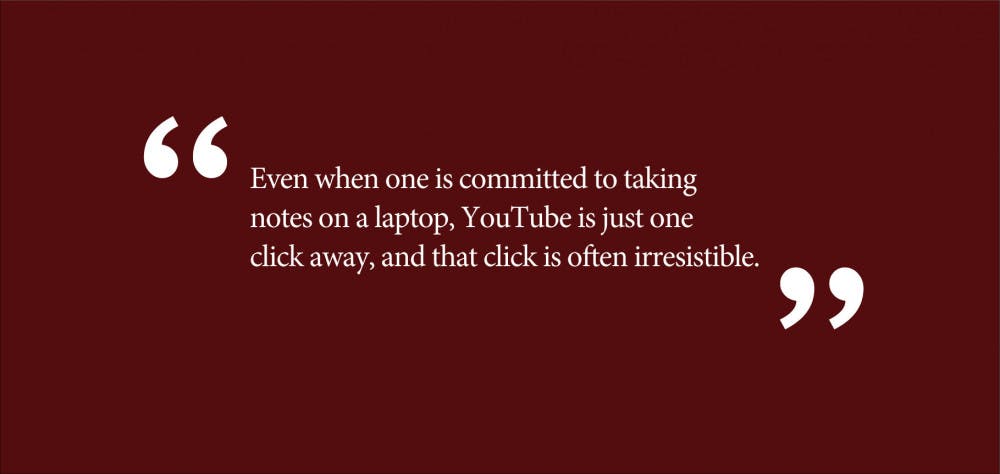Laptops are ubiquitous in Brown’s classrooms. Whether in a 100-student lecture or a small seminar, many students spend most of the class staring intently at the screen a few feet in front of them, rather than at the professor or the board. Just a cursory glance from the back of the classroom will show you the range of things that are competing successfully with the professor for the students’ attention: Facebook, iMessage, games, online shopping. Indeed, everyone at Brown has had the experience of sitting in eyesight of another student’s flashy distraction, if not already preoccupied by their own. I’m calling on Brown to ban laptops from the classroom not just in attempt to generalize a pet peeve of mine, but because many studies actually suggest that students who use laptops in class — and those sitting around them — consistently retain less information and perform more poorly on tests. Brown ought to heed the implications of these studies by banning laptops from the classroom.
Laptops make it too easy and too tempting to multitask, thereby distracting students from focusing on the content of the class. Even when one is committed to taking notes on a laptop, YouTube is just one click away, and that click is often irresistible. In a seminal 2003 study at Cornell, half of a class was permitted full use of their laptops, while the other half was not. The half using laptops performed much worse on assessments of the material taught in the lecture. A 2006 study, moreover, found the more often that students used a laptop in a class, the worse they performed. And laptops have been found to hinder performance in an entire course, not just in individual lectures. In a 2016 study at the United States Military Academy, classrooms that allowed laptops produced lower scores on final exams than did classrooms that prohibited them. Findings such as these refute the potential argument that typed notes on a laptop leave students more prepared for final exams.
Even if one considers the enjoyment of using Facebook in class to be worth the cost of performing more poorly in that class, the surrounding students should not be forced to make that trade-off. In an important 2012 study, it was not only those who were multitasking on laptops that received lower scores on tests of the lecture’s content. Those who directly viewed a laptop-using peer also received lower scores. In this way, one student on Facebook unwittingly distracts many other students as well.
Some may argue that laptops, when they are not distracting everyone with social media and games, serve a useful purpose: students can type much faster than they can write, so laptops enable them to take more thorough notes. This is certainly true. While typing, one is able to capture the professor’s words almost verbatim. But verbatim notes, research suggests, may not be a good thing. University of California and Princeton studies from 2012 found that students who took notes on laptops tended to transcribe the professor’s words nearly precisely, yet they performed more poorly when quizzed on that material, whether the quiz was given immediately after the lecture or a week later, than did those who took notes with the old-fashioned pen and paper. The researchers surmised that a student taking notes by hand, who does not have time to write down everything, must therefore conceptualize the material in order to extract the most important information. When quickly typing notes, a student does not have to conceptualize the material and therefore does not learn it as thoroughly.
Another alleged benefit of laptops is that they allow students to supplement what is being taught in class with other relevant information from the internet, whether from Canvas or from Wikipedia. In theory, this sounds great. But in practice, probably very little of the internet browsing that students do in class is actually related to the class. A 2017 study at Michigan State University sought to measure objectively the ways in which laptop users spent their time in classrooms. Throughout a semester, 85 students logged onto proxy servers that tracked their internet browsing history, the duration of their internet browsing and the frequency. Researchers could then see exactly which websites students visited, and for how long. They found that students spent nearly 40 minutes of every 100-minute class period on the internet for things unrelated to class, such as social media, email, videos and games. By contrast, students spent an average of less than five minutes using the internet for things related to class, such as viewing the syllabus or course-related slides. Again, the more students used the internet, the worse they performed in the class. This correlation was upheld even after researchers accounted for the motivation, the interest and the intelligence of the students — this means it is not the case, as some might conjecture, that less interested, less motivated, or less intelligent students are more likely to use laptops; rather, the laptops themselves caused the students to perform poorly.
One exception to my proposed ban on laptops is for students whose SEAS accommodations permit the use of laptops in class. Of course, students who absolutely cannot perform without the aid of a laptop deserve access to one. But otherwise these devices are distracting, and moreover, just plain annoying. If Brown wants its students to learn more, it should do away with them from the classroom.
James Flynn ’20 can be reached at james_flynn1@brown.edu. Please send responses to this opinion to letters@browndailyherald.com and op-eds to opinions@browndailyherald.com.





